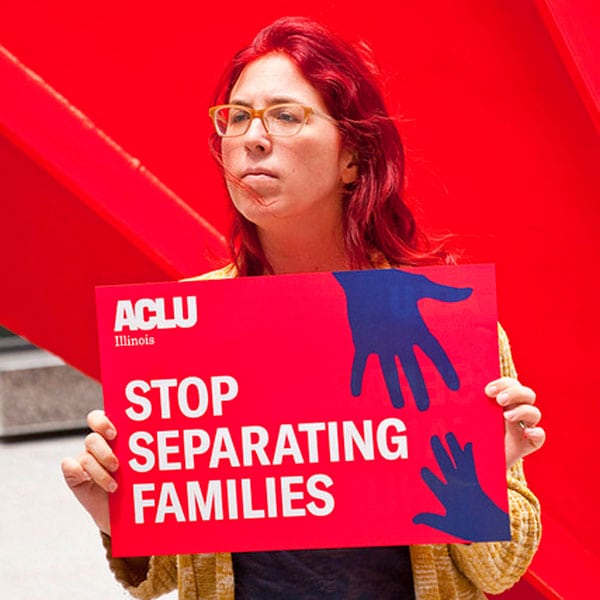
The extant US practice of separating parents from their children for the misdemeanor of being in the country illegally is a test and we know it. It is a test administered by Trump and his collaborators to see how much the people of this country will buy in to the idea of being under attack by “others.” Not the others from Norway, but those from Haiti, Central America, and other places where Black and brown families live. Clearly, this is not just about immigration.
NPR reported yesterday that Homeland Security Secretary Kirstjen Nielsen said, “This administration has a simple message: If you cross there border illegally, we will prosecute you.”
But it’s not that simple, as Nielsen soon found out. After she tweeted, “We do not have a policy of separating families at the border. Period,” the ACLU responded with, “You have a policy of criminally prosecuting any asylum seeker who crosses the border between ports of entry. Period. Parents go into custody and kids are shipped off to facilities—over a misdemeanor. You also have a record of not giving kids back after parents serve time.”
Many others weighed in:
- “Then stop.”
- “Ummm…here’s the policy.”
- “Your children will someday be riddled with shame for what you have allowed yourself to become. Why would you be willing to tell such lies for the nastiest man on the planet?! There is no saving your soul. I hope you end up prosecuted for this.”
- “THIS IS NOT TRUE. THIS IS NOT TRUE. THIS IS NOT TRUE. THIS IS NOT TRUE.”
The New Yorker, among many, reports that, “In the past two months, the government has taken some two thousand immigrant children away from their parents.” According to Texas Republican Representative Will Hurd, “one hundred of those kids were under the age of four.”
What’s worse, “No protocols have been put in place for keeping track of parents and children concurrently, for keeping parents and children in contact with each other while they are separated, or for eventually reuniting them. Immigration lawyers, public defenders, and advocates along the border have been trying to fill the void.”
There are three agencies implementing Attorney General Jeff Session’s zero tolerance policy for this misdemeanor:
Immigration and Customs Enforcement—the agency at the DHS that handles immigrant parents—is designed to deport people as rapidly as it can, while [the Office of Refugee Resettlement, or] ORR—the office within the Department of Health and Human Services (HHS) that assumes custody of the kids—is designed to release children to sponsor or foster families in the US. Lately, ORR has been moving more slowly than usual, which has resulted in parents getting deported before their children’s cases are resolved. There’s next to no coordination between DHS and HHS.
Two polls by CNN and Quinnipiac University this week on the separation of families show that two-thirds of respondents oppose the practice. Governors, state attorneys general, and many in Congress have decried the practice, calling for an end to “child internment camps.”
The New York Times reported that, “The United Nations’ top human rights official on Monday entered the mounting furor over the Trump administration’s policy of separating undocumented immigrant children from their parents, calling for an immediate halt to a practice he condemned as abuse.” They cited “an observation by the president of the American Association of Pediatrics that locking the children up separately from their parents constituted ‘government‐sanctioned child abuse.’”
The American Psychiatric Association issued the following statement:
As physician experts in mental health, the American Psychiatric Association opposes any policy that separates children from their parents at the United States border. Children depend on their parents for safety and support. Any forced separation is highly stressful for children and can cause lifelong trauma, as well as an increased risk of other mental illnesses, such as depression, anxiety, and post-traumatic stress disorder (PTSD). The evidence is clear that this level of trauma also results in serious medical and health consequences for these children and their caregivers. Many families crossing the United States border are fleeing war and violence in their home countries and are already coping with the effects of stress and trauma. These children deserve our protection and should remain with their families as they seek asylum. The APA recommends an immediate halt to the policy of separating children from their parents.
As the backlash grew and took over the news cycle, NPR reported that,
House Republican leaders are reworking their “compromise” immigration bill to include a provision that modifies—but doesn’t completely end—the “zero tolerance” policy being enforced now by the Trump administration.
Sign up for our free newsletters
Subscribe to NPQ's newsletters to have our top stories delivered directly to your inbox.
By signing up, you agree to our privacy policy and terms of use, and to receive messages from NPQ and our partners.
[…]
Public pushback to young children being housed separately in detention centers has put pressure on Congress to end that practice.
Hurd’s response: “The way they’re trying to address family separation is by allowing (the Department of Homeland Security) to indefinitely detain families. And so they think, by indefinitely detaining families, then that’s keeping the family together. That’s not solving the problem of family separation.” He favors restoring ICE’s Family Case Management Program, where immigrants wore ankle monitors, which resulted in 95–99 percent of immigrants showing up to their court cases, and cost $36 a day per family—in addition to addressing the root causes of immigration from Central America.
Describing “conditions in the recently opened tent city in far west Texas,” Rep. Hurd notes, “This place is being run by emergency management professionals that have been in probably every disaster you can name in the past decade.”
Elizabeth Oglesby, Associate Professor of Latin American Studies and Geography at the University of Arizona, reflecting on research she conducted in Massachusetts, Iowa, and South Carolina from 2007 to 2013, finds that “large-scale raids are experienced locally as disasters, even by those not directly affected.”
She described these raids as “spectacles, with helicopters and hundreds of ICE agents.”
Recalling the 2007 raid in the Michael Bianco factory in New Bedford (which made backpacks for the Pentagon), social worker Marc Fallon said, “It was like a military operation.” Corinn Williams, director of the Community Economic Development Center, said, “It was like a war zone. Family members were walking around in a daze looking for their loved ones.” Minister David Vasquez-Levy said, “We started a list on paper, then a spreadsheet, then a complicated database. It was like a list of the disappeared in Guatemala.”
Landlords had children dropped off at apartments without parents. Churches, immigration lawyers, and community advocates “scrambled to provide legal aid, track down children and missing detainees, and stock food pantries.” Postville, Iowa lost a third of its residents, “devastating the small town’s economy.”
Oglesby notes that the shock of the raids also “produced sympathy toward immigrants” and highlighted “the many ways immigrants are part of a community’s social fabric.” The raids also transferred these “humanitarian responses…into political alliances through grassroots action.”
As the Trump administration response shifted to hunkering down, yesterday, we learned that it plans to withdraw from the United Nations Human Rights Council. Further, Trump tweeted about immigrants “infesting” our country, in his usual, carelessly dangerous, dehumanizing style.
Naomi Klein’s crisis capitalism’s biggest ally is crisis governance. Immigrants who enter the country without approval, fleeing the frontlines of the many postmodern disasters, are people trying to survive in inhospitable times. They are family, friends, neighbors. The real crises are labor insecurity and economic precarity, unengaging and ineffective governance, the hardening of the heart. The “immigration crisis” is constructed. The real crisis is a crisis of humanity.
While the blowback from “the people”—those of us who don’t see living with people who may be considered different as a crisis—has been unequivocal, what this moment also highlights is that there is no process for how to deal with a leader who is unabashedly playing outside the rules, not just of democracy, but of morality.
As we in civil society—nonprofits and social movements—find ourselves overwhelmed by crises as the new norm, we must learn how to take full advantage of these disruptive events to shift the course of history towards justice and interdependence. This is our learning curve.













